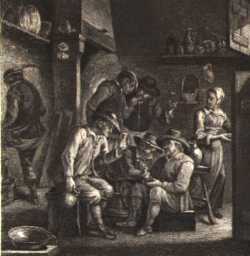Inns And Taverns In Society


People have begun to spend a lot of their extra time and earnings in taverns (by which we mean "taverns, inns, and alehouses"), which sat well with everyone but the church. Taverns formed the chief alternate center of social life to the church. They were a public gathering place, where you could see your neighbors and even hold events like weddings and wakes -- presided over by itinerant priests. Laws were in enacted in England and on the continent to make such non-church religious events illegal.
Established churchmen viewed these makeshift 'churches' as a threat to their livelihood and function. It could be argued that the rise of the concept of a direct relationship with God (as opposed to one that went through a representative like a priest) paralleled the rise of taverns as public spaces.
Taverns were also frowned upon because they encouraged gaming as well as drinking, providing cards, dice, and table-top games to patrons. It was also common to set up bowling-like games and archery shoots (very short range!) in the alleys between the buildings (hence bowling alley). We will try to do this if we can -- the alley will really be outside!
Additionally, taverns quickly developed a reputation as a place for criminals and criminal activity. Most of the barmaids working in taverns also picked up some extra money engaging in the oldest profession, at least on an amateur basis. Because folks often paid their bills in kind, tavern-keepers often served as fences for dubiously-obtained goods. Innkeepers also often became money-lenders.
In a time when travelers were viewed with suspicion (people from the next town were 'foreigners'; those from other countries, "aliens"), a place which catered to them naturally fell under the same suspicion. While the reputation that tavern-keepers developed for collusion with thieves is not entirely undeserved, we'd like to point out that most taverners (or 'tipplers') were simply honest businessmen and women with some spare room and a talent for brewing beer, ale, and hard cider.
In a few towns, locals were forbidden to go to inns, on the theory that they encouraged debauched behavior and caused them to spend their money wastefully.
There is a distinction between taverns, inns, and alehouses, which we do not often make. A tavern serves only drink, an alehouse (in English usage anyway) served both drink and food, and an inn provided lodgings in addition to food and drink. Le Poulet Gauche is in fact a small inn, with a common room serving both food and drink, a few sleeping rooms upstairs, a yard, and a small stable. It has a small kitchen garden and a few chickens out back.